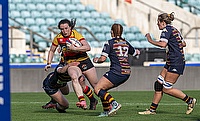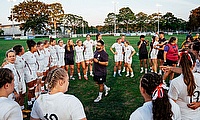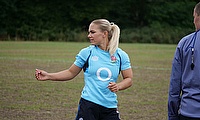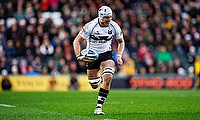The Story of Success - GB Students Sevens Crowned World Champions
As a fantastic summer of sevens came to a close with tournaments all over the country and the Commonwealth Games winning thousands of new fans, one of the nation’s most impressive victories came from the Great Britain Students side.
GB’s men’s University sevens team made the long journey to South America to successfully defend their World Championship crown at the FISU World University Championships in Campos, Brazil.
The band of British university scholars were selected from all over the nation to defend the crown won two years ago in Brive, after defeating France in the final.
This time it was another European rival who they faced in the showpiece game – Belgium. After a hard-fought first half, it was the Brits who seized the upper hand and went on to secure a 17-7 victory and the title of World Champions.
There was also an individual honour as Teeside University’s Aaron Myers, the team captain, was awarded the Player of the Tournament.
The team got their campaign underway in fine form with a dominant 40-7 victory over Canada in the opening game. However, GB then endured a set-back in their second round of fixtures, as they went down 12-5 to an impressive French side.
Though, after beating Namibia 43-7 and then edging past Japan 17-14 in a nail-biting final pool match, they headed through to the knockout stages of the tournament.
Britain faced the hosts in the semi and after another difficult first half – going down by two tries – they eventually secured their final spot with Belgium after a nervy 12-10 win.
Despite once again going behind, Great Britain hit back hard with a try from Robert Coote and two more from Ruaridh McConnochie giving them the win.
Talking Rugby Union’s Austin Halewood spoke to Team Manager Phil Llewellyn about the tournament itself and what the win means to student rugby in Britain.
“It was a fantastic feeling to win,” Phil recalled. “We went into the tournament as defending champions but none of the guys were actually part of the team two years ago when we won.
“It’s always a difficult one with sevens: you want to do well and you expect to be there or there abouts but there are certainly no guarantees or any bankers so we wanted to make sure we represented GB well and to come away and win it was almost a surprise, to be honest.
“We always thought we were good enough to win but you never want to count your chickens and nail on that you expect to so, yeah, it was an awesome experience for everyone.”
Phil, who is currently studying Sports Coaching at Gloucester University, is the side’s Team Manager and he has been involved with the guys all the way through from selection to lifting the final trophy.
“I was asked by the Students RFU to take on the role,” Phil began, “which is the logistics, putting the squad together and just working with the coaches to make sure that everything is in place before the tournament and during.
“It’s been a great opportunity for me and I must say a massive thanks to the RFU and the SRFU for asking me to do the job.”
Pre-tournament one of the most important jobs for the backroom staff, of course, is selecting the team. This is a process that is consistently on-going in the interim between World Student Sevens tournaments and Phil explained exactly how they go about it.
Obviously, with student rugby being dominated for most of the academic year with the 15-a-side game, it can be difficult to know what players are like in sevens action.
“A lot of it was based on pretty much what we knew of guys already,” Phil explained. “We were all at the BUCS 7’s tournament at Clifton, so we’d seen a lot of guys involved there and we knew the pedigree of a number of them already - people like Arron that have played for the Wailers on the circuit for years
“We also took a side to the third leg of the GB7’s Series at Colwyn Bay, so we selected a team of players to go up there to represent the England IPF charity side – and a few of the guys had already been involved in the first two legs when it was made up of more of the full-time England Sevens side.
“We’ve had a great base of players and I think it’s really positive that there’s so much more sevens across the summer now for those guys to keep developing and to keep getting those experiences.”
The competition itself has been running for was made up of nine teams in total, from all over the globe, with the GB team and the French being the most notable rugby nations.
Obviously Brazil, itself, is not strictly known for its rugby prowess; however, with an Olympic Games just around the corner in 2016, with sevens rugby an official event for the first time in the Games history, the country is beginning to push the shorter form of rugby.
“The locals were really starting to get behind the game; there was a really big media push in San Jose Dos Campos. There was coverage on the television and other media exposure so they’d obviously been pushing it for a while.
“The crowds weren’t massive, but I think there was a really great awareness of the tournament, whether you were down at the shopping mall or in the town – it was great to see.”
Over the course of the tournament there was a number of players who stood out and made names for themselves as successful sevens talent for the future.
“It’s a really difficult one to pick out players,” Phil confessed, “the staff sat together and asked ‘who do you think your player of the tournament is?’ and it could’ve been about four or five different people.
“When you hear it was a ‘team performance’ it’s something that maybe coaches don’t always mean, but we as staff all picked different people and it really was a great team performance.
“All credit to him I though Aaron Myers as captain was outstanding; he’s played a lot of sevens, does his basics well and works very, very hard.
“The two boys who are full time in terms of Sam Blanchet and Jack Walsh brought a huge amount of experience, which was great and then I’d probably say Ruaridh McConnochie – who came off the bench in the semi and the final and pretty much changed the game both times to be honest with how direct he was and then with two scores in the final.
“Since then he has been invited down to training with England Sevens and hopefully he will be next week as well.
To finish Phil then added that “the sevens season doesn’t necessarily fit university rugby because of term times and exams but the Students RFU are looking at projects and how we can actually develop that sevens strand to run in-line with the BUCS programme and the 15’s stuff that they do.
“We want to make it feasible for universities to really push sevens, not as a separate sport, but as a dual purpose sport in effect and really nail that down.
“Hopefully those developments will progress over the next 18 months and keep pushing the student game forward.”








